Category: notizia ITA
Sostenere la filiera del settore tessile per creare occupazione ed opportunità economiche in Giordania “Creative Jordan” – Cerimonia di diploma del programma di formazione

©UNIDO Giordania
AMMAN — Finanziato dal Governo italiano attraverso l’Agenzia Italiana per la Cooperazione allo Sviluppo (AICS), il progetto “Sostenere la filiera del tessile per creare occupazione ed opportunità economiche in Giordania” – conosciuto con il nome di “Creative Jordan” – martedì 21 Febbraio 2023, ha visto diplomarsi 170 partecipanti alla fine un programma di formazione completo.
L’Organizzazione delle Nazioni Unite per lo Sviluppo Industriale (UNIDO) e il Design & Training Services (GSC), esecutori di questo progetto di successo, hanno organizzato la cerimonia di consegna del certificato per i designer e i professionisti partecipanti delle piccole e medie industrie (PMI) dell’abbigliamento e del tessile.
A seguito di un diffuso invito a presentare candidature, 170 partecipanti sono stati selezionati in base a criteri di ammissibilità stabiliti da esperti e ai risultati di uno studio di valutazione delle esigenze che era stato preventivamente condotto per raggiungere chi più ne avrebbe avuto beneficio.
Il programma di formazione intensivo, della durata di tre mesi (174 ore), che ha fornito una qualifica professionale nel rispetto dei più elevati standard e pratiche internazionali, ha trattato i seguenti argomenti: programmi di formazione tecnica e di sviluppo delle competenze tra cui modellistica, produzione di abbigliamento e disegno di moda digitale, che sono stati offerti sia alle PMI e che ai singoli progettisti individuali. La formazione sullo sviluppo aziendale è stata fornita a PMI selezionate, formatori del GSC, singoli progettisti e tirocinanti, coprendo argomenti relativi allo sviluppo aziendale, al marketing, all’esportazione e all’approvvigionamento.
Vale la pena notare che le donne rappresentano oltre l’80% del totale dei partecipanti alla formazione, il che rafforzerà la loro partecipazione in questo settore.
Il progetto “Creative Jordan”, creando posti di lavoro, mira a sostenere la filiera del tessile in Giordania ed il rilancio dell’economia del Paese. I due marchi di moda “JO! By Creative Jordan” e “Khayt” (filo), fungono da tema narrativo per l’industria della moda e saranno ulteriormente promossi sui mercati internazionali, oltre a fornire formazione tecnica ai partecipanti.
L’esito del progetto è ottimizzato per essere in linea con la legge giordana e con gli obiettivi fissati nel Piano di crescita economica della Giordania 2018-2022, nonché con la “Jordan’s Vision 2025”.
Il Direttore AICS Luca Maestripieri in visita in Giordania e Iraq

Amman – Il Direttore Maestripieri con lo Staff AICS ad Amman.
La visita del direttore di AICS Luca Maestripieri in Giordania ed in Iraq ha avuto luogo dal 23 al 26 aprile 2023.
Ad Amman, il direttore ha avuto modo di apprezzare il lavoro di gestione delle iniziative di sviluppo e aiuto umanitario gestite dalla sede: circa 50 per 80 Ml di euro in Giordania e oltre 30 per quasi 45 Ml di euro in Iraq.
Negli incontri con le OSC, in entrambi i Paesi, il dialogo è stato imperniato sul nexus umanitario-sviluppo-pace.
Infatti, in Giordania, quasi il 7% della popolazione totale – di circa 10.5 Ml – è rappresentato da rifugiati da vari Paesi del Medio Oriente e dell’Africa; solo dalla Siria provengono circa 1.3 Ml di persone.
In Iraq vi sono 1,2 milioni di sfollati e rifugiati, di cui i rifugiati siriani sono quasi il 22%.
178.691 sono alloggiati in campi di accoglienza che rimangono aperti per lo più nel Kurdistan iracheno (25 campi sui 26 attualmente funzionanti).
A Baghdad, è stato aperto il nuovo ufficio di programma di AICS Amman, situato presso l’Ambasciata d’Italia, in cui è prevista la presenza costante di un esperto e la possibilita’ di operare nella capitale da parte tutto il team Iraq.
Il programma è proseguito con la visita ai locali del progetto che sostiene le minoranze cristiane promuovendone la formazione professionale. Nel corso di una colazione di lavoro organizzata presso l’Ambasciata, il direttore ha incontrato i rappresentanti della CRI e delle agenzie ONU sostenute da AICS, che hanno espresso apprezzamento per il contributo dell’Italia a supporto del governo e del popolo iracheni.
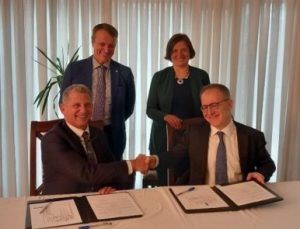
Baghdad – L. Maestripieri, K. Grazia, E. Cabasino e Amb. F. Greganti al momento della firma per l’apertura dell’Ufficio di programma AICS.
Nel Kurdistan iracheno – dove AICS Amman è presente con un ufficio ad Erbil dal 2019 – il Direttore ha avuto incontri bilaterali con il Ministro degli Interni e la Ministra del Lavoro e degli Affari Sociali, per parlare della presenza di rifugiati siriani e sfollati iracheni e delle case-rifugio per le donne sopravvissute alla violenza, iniziativa per la quale il sostegno dell’Italia è particolarmente apprezzato. Uno dei progetti finalizzati all’autosufficienza finanziaria dei rifugiati siriani ed una delle sedi del numero verde per contrastare la violenza sulle donne, sono state le destinazioni delle visite sul campo.
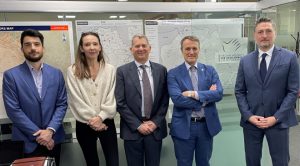
Erbil – Da sx a dx: Cons. M. Camerota, Dir. AICS L. Maestripieri, Titolare E. Cabasino, Team Leader L. Cicinelli e programme officer R. Bonu.
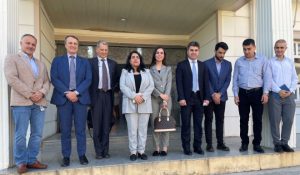
Erbil, sede numero verde contro violenza sulle donne del “Directorate Combating Violence against Women – DCVAW” del Kurdistan.
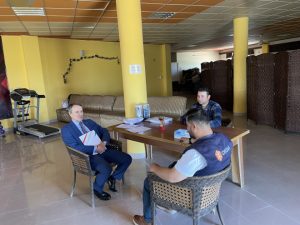
Erbil – il Direttore AICS nella palestra di Chiya Musa rifugiato siriano
Avvio delle attività di formazione del progetto ‘Creazione del Centro Regionale per la Conservazione e il Restauro di Jerash’
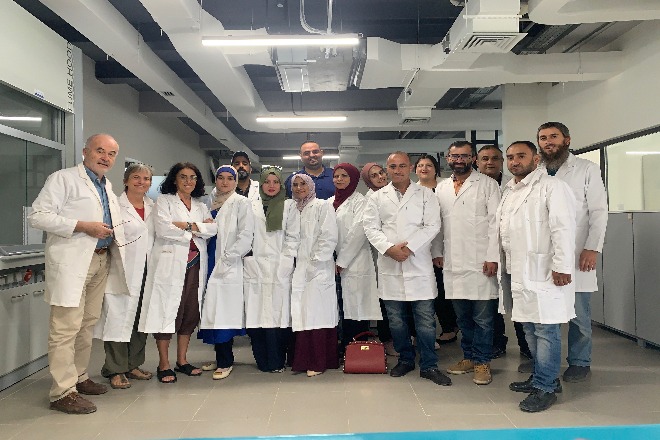
Il coordinatore delle attività di formazione Prof. Mario Micheli dell’Università degli Studi di Roma Tre con due docenti e i beneficiari del Jordan Department of Antiquities (DoA) nella sede del RCCR
Jerash (Gerasa), Giordania, 1° novembre 2023 – Avvio ufficiale dei corsi di formazione presso la sede del Centro Regionale per la Conservazione e il Restauro (Regional Center for Conservation and Restoration – RICR) di Jerash che prevedono un programma di formazione a favore del Department of Antiquities (DoA) giordano e il cui obiettivo è il miglioramento delle competenze specialistiche nel settore della conservazione e del restauro del patrimonio culturale.
Nell’ambito della prima fase del programma, realizzato con fondi italiani e avviato nel 2019, l’Agenzia UNOPS (United Nations Office for Projects Services), ha completato la ristrutturazione e l’allestimento dell’edificio che oggi ospita il Centro.
Le attività di formazione saranno condotte dall’Università degli Studi Roma Tre in collaborazione con l’ “Istituto Centrale del Restauro del Ministero della Cultura italiano” e la “Fondazione Scuola dei beni e delle attività culturali”. Due i corsi specialistici: nel primo anno, la conservazione e il restauro di ceramiche e terracotta, metalli, materiali organici e vetro, nel secondo, la conservazione e il restauro dei materiali lapidei e delle superfici decorate dell’architettura e dei mosaici.
Nel corso dell’ultimo anno gli studenti beneficiari diventeranno a loro volta formatori, secondo il modello di Formazione dei Formatori (ToT). Ciò consentirà al RCCR di acquisire rapidamente un ruolo centrale a livello regionale nel campo del restauro e della conservazione del patrimonio culturale. Le attività didattiche avranno fine a metà del 2025.
AICS: al fianco della Giordania per una pubblica amministrazione più forte
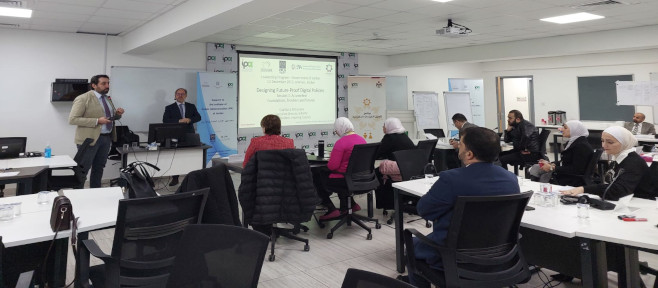
L’Agenzia Italiana per la Cooperazione allo Sviluppo (AICS) è orgogliosa di essere un partner chiave nel progetto “Sostegno all’Istituto della Pubblica Amministrazione della Giordania” (IPA), che mira a migliorare la capacità e l’efficacia della pubblica amministrazione giordana. Realizzato dall’Organizzazione Europea di Diritto Pubblico (EPLO) in collaborazione con la Scuola Nazionale di Amministrazione Italiana (SNA), il progetto ha già ottenuto risultati significativi nel suo primo anno di attività.
Principali successi:
Oltre 1.670 dipendenti pubblici giordani hanno già beneficiato della formazione
Lancio del Leadership Program presso l’IPA
Sviluppo del primo Diploma in Pubblica Amministrazione e Policy Making in Giordania
Erogazione di programmi di formazione sulla trasformazione digitale e sulla gestione dei progetti
Creazione di un Innovation Lab all’interno dell’IPA
AICS è impegnata a sostenere lo sviluppo e la prosperità della Giordania: riteniamo che una pubblica amministrazione forte sia essenziale per fornire servizi efficaci ai cittadini e promuovere la crescita economica. Siamo orgogliosi di collaborare con IPA, EPLO e SNA per raggiungere questo obiettivo.
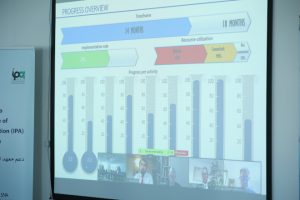
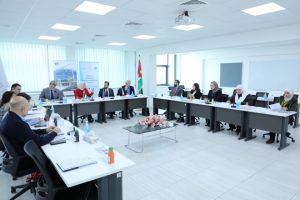
Video “Madrasati Ahla: la mia scuola è più bella”
Progetto a sostegno dell’educazione in Giordania per le comunità rifugiate dalla Siria
